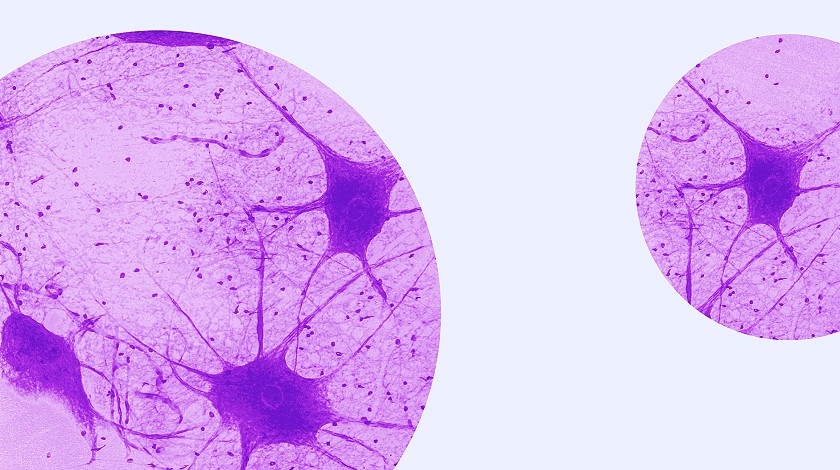A legacy of leadership in mental health
Leveraging years of research and development, AbbVie scientists are committed to finding answers to some of the most complex questions in psychiatry.
Working to address complex mental health challenges
It’s hard to escape talk about mental health these days. It’s splashed across media headlines in publications worldwide and frequently used in conversations on social media. Celebrities, athletes and politicians are opening up more about their struggles with mental illnesses.
Despite the increased focus on mental health, a stigma still shrouds the words “mental illness.” Understanding the complexities surrounding mental illnesses – and how we can treat them – has never been more important.
According to the World Health Organization, one in every eight people, or 970 million people globally, are living with a mental illness, with anxiety and depressive disorders being the most common.1 Untreated mental illnesses can lead to unnecessary disability, lack of employment, substance abuse, homelessness, inappropriate incarceration, poor quality of life and even suicide.2
“If left untreated, mental illnesses can make patients’ lives unmanageable and have devastating impacts on those – in many cases loved ones – around them,” said Nikil Patel, PharmD, vice president, U.S. medical affairs, AbbVie. “With care, support and the right treatment, people can manage their mental illness.”
At AbbVie, teams have passionately worked on complex mental health challenges for over three decades with a shared goal of addressing unmet patient needs. Today AbbVie offers a portfolio of medicines and a pipeline across psychiatric conditions. Our scientists remain committed to finding answers to the most complex questions and solutions to the most difficult challenges in psychiatry.
Unraveling the complexities in psychiatry
Despite decades of research and development, the science surrounding mental illness remains notoriously challenging.
One challenge is the way psychiatrists diagnose patients. Whereas other specialties have vast laboratory methods to determine important information about a patient’s health — and make related diagnoses and treatment decisions — psychiatrists have to consider what patients tell them and how they behave. And while other diseases have validated biomarkers to help health care providers diagnose and treat various conditions, similar ones for psychiatric disorders have yet to be found, much less validated.
“We can't measure mood in a mouse the same way you might measure a tumor,” said Julie Adams, M.D., executive medical director and global development lead of psychiatry, AbbVie. “Further, lab-grown neurons may teach us how a particular molecule influences an isolated neuron. But in a brain that neuron is influenced by hundreds of molecules and thousands of other neurons. It is a bit like trying to learn about the galaxy by studying the fragments of an asteroid.”
Despite recent advances in science and technology, the underlying biology of these conditions still needs to be fully understood. This is one of the significant challenges researchers encounter when developing new medicines for psychiatric disorders. Animal models are still not a good predictor of whether a drug will be effective in patients.
Finding the right treatment option can also prove challenging. For example, many people diagnosed with depression still have unresolved symptoms after beginning treatment. Moreover, some medications can take weeks to take effect. Others come with myriad side effects, often leading to treatment discontinuation.
These challenges have made exiting psychiatry the more accessible option for many companies. But those living with mental health conditions worldwide depend on the medical and scientific community to continue researching and developing new treatment options.
That’s why at AbbVie, researchers are entering a new frontier of psychiatry drug development through precision medicine. Through this approach, we aim to increase the chance of success in bringing new treatments to patients.
New frontiers in psychiatric research and development
AbbVie scientists are looking for psychiatric biomarkers using advanced tools such as high-frequency data sampling of mood and behavior, AI-enabled analysis of older methods such as EEG (recordings of electrical patterns in the brain), and functional imaging (visual recordings of various brain activities taken while people are doing specific tasks).
Advances in genetic analyses and other physiologic parameters also offer an opportunity to discover connections between biology and behavior in ways previously unavailable to psychiatric drug discovery.
Psychiatry remains a complex field, but AbbVie is committed to unraveling these complexities and focused on uncovering new insights to help drive meaningful and impactful change for patients.
References:
- World Health Organization, “Mental Disorders.” www.who.int/news-room/fact-sheets/detail/mental-disorders. Accessed 18 July 2023.
- NAMI California “About Mental Illness.”www.namica.org/what-is-mental-illness/. Accessed 18 July 2023.
Media inquiries:
Email: [email protected]



